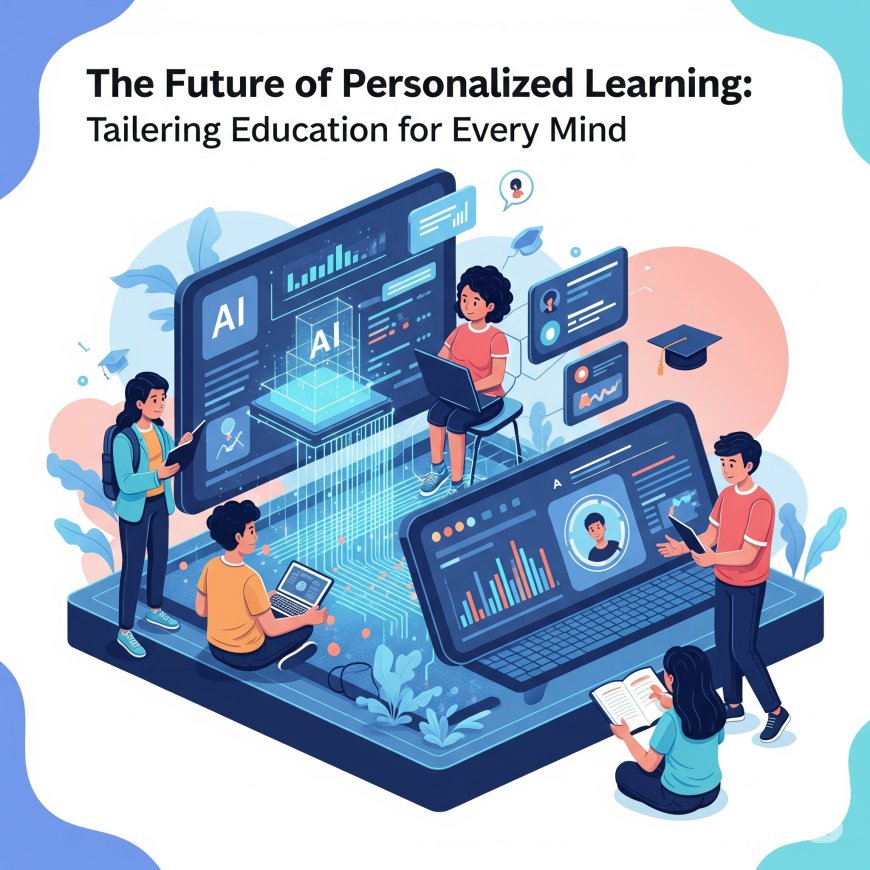The Future of Personalized Learning: Tailoring Education for Every Mind
Explore how personalized learning is transforming education, leveraging AI, adaptive technologies, and individualized pathways to create engaging and effective learning experiences for every student. Discover the benefits, challenges, and exciting potential of this pedagogical revolution. Keywords: personalized learning, future of education, AI in education, adaptive learning, individualized instruction, educational technology, student-centered learning, lifelong learning, education innovation

The Future of Personalized Learning: Tailoring Education for Every Mind
The traditional one-size-fits-all model of education is rapidly giving way to a more dynamic and effective approach: personalized learning. Imagine a classroom where every student learns at their own pace, with content tailored to their unique strengths, weaknesses, and interests. This isn't a futuristic fantasy; it's the evolving reality of education, driven by advancements in technology and a deeper understanding of how humans learn.
At its core, personalized learning aims to address the diverse needs of individual learners. It moves beyond standardized curricula to create educational pathways that are truly bespoke. This shift promises to unlock greater potential in students, fostering deeper engagement, improved outcomes, and a lifelong love of learning.
The Pillars of Personalized Learning
Several key elements underpin the personalized learning revolution:
-
Adaptive Learning Technologies: AI-powered platforms are at the forefront, analyzing student performance in real-time and adjusting the curriculum accordingly. If a student grasps a concept quickly, the system can provide more challenging material. If they struggle, it can offer additional resources, different explanations, or practice exercises.
-
Individualized Learning Paths: No two students learn identically. Personalized learning recognizes this by allowing students to progress through material at their own speed. This means some might accelerate through subjects they excel in, while others take more time with areas they find difficult, all without being left behind or held back.
-
Student-Centered Approach: The student becomes the active driver of their learning journey. They are encouraged to take ownership, set goals, and make choices about how and what they learn, fostering critical thinking, self-direction, and problem-solving skills.
-
Data-Driven Insights: Sophisticated analytics provide educators with valuable insights into student progress, engagement, and areas of struggle. This data allows teachers to intervene effectively, offer targeted support, and refine learning strategies for individual students.
-
Rich and Diverse Content: Personalized learning leverages a vast array of digital resources, including interactive simulations, videos, games, virtual labs, and real-world projects. This multi-modal approach caters to different learning styles and keeps students engaged.
The Role of AI and Machine Learning
Artificial intelligence and machine learning are the engines driving much of the innovation in personalized learning. These technologies can:
-
Assess Learning Styles: AI algorithms can analyze how a student interacts with content to identify their preferred learning modalities (visual, auditory, kinesthetic, etc.).
-
Predict Learning Gaps: By analyzing performance patterns, AI can anticipate potential areas of difficulty before they become major roadblocks.
-
Recommend Resources: Based on individual needs and interests, AI can suggest relevant learning materials, exercises, and projects.
-
Automate Feedback: Intelligent tutoring systems can provide instant and constructive feedback, allowing students to learn from their mistakes immediately.
Benefits Beyond the Classroom
The impact of personalized learning extends far beyond academic achievement. It cultivates crucial skills for the 21st century:
-
Increased Engagement and Motivation: When learning is relevant and tailored, students are more likely to be interested and motivated.
-
Deeper Understanding: Focusing on individual needs allows for a more thorough grasp of concepts rather than rote memorization.
-
Development of Self-Directed Learners: Students learn to take initiative, manage their time, and solve problems independently, preparing them for lifelong learning.
-
Equity in Education: Personalized learning can help bridge achievement gaps by providing targeted support to students who need it most.
-
Preparation for the Future of Work: The ability to learn continuously and adapt to new information is paramount in a rapidly changing world.
Challenges and the Path Forward
While the promise of personalized learning is immense, there are challenges to address:
-
Teacher Training and Support: Educators need comprehensive training to effectively utilize new technologies and facilitate personalized learning environments.
-
Infrastructure and Access: Equitable access to technology and reliable internet connectivity remains a hurdle in many regions.
-
Data Privacy and Security: Safeguarding student data is paramount and requires robust policies and technologies.
-
Maintaining Human Connection: Technology should augment, not replace, the vital role of teachers in fostering social-emotional development and mentorship.
The future of personalized learning is bright. As technology continues to evolve and our understanding of pedagogy deepens, we are moving towards an educational landscape where every student can thrive, reaching their full potential and becoming lifelong, empowered learners. This paradigm shift holds the key to unlocking a more effective, equitable, and engaging educational experience for all.
What's Your Reaction?
 Like
0
Like
0
 Dislike
0
Dislike
0
 Love
0
Love
0
 Funny
0
Funny
0
 Angry
0
Angry
0
 Sad
0
Sad
0
 Wow
0
Wow
0



















